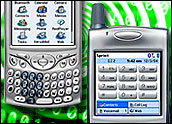
Yahoo has introduced a new version of its popular Yahoo Messenger instant messaging service that eliminates the need to download and install software. Still in the beta phase, the new “Yahoo Messenger for the Web” is browser-based.
That means Yahoo Messenger users can log in to chat on any computer or other device with Web access, including PCs at companies that forbid software downloads. The new application is “the first brand-new Messenger in over six years,” noted Jeff Bonforte, vice president of product development for Yahoo Messenger, in his blog.
Yahoo is far from the first Internet player to offer a Web-based instant messaging service — AOL, Google, Meebo and eBuddy are among the competitors. However, the announcement is important due to the sheer number of people who use Yahoo Messenger: 88.5 million, according to Yahoo, a number that grew substantially last year when Yahoo and Microsoft announced interoperability between Messenger and Windows Live Messenger, Microsoft’s IM product.
Chat Lite
The new Yahoo chat client differs from most other Web-based clients in that it is based on Adobe Systems’ Flash. It works with most Web browsers and operating systems.
While it lacks some of the bells and whistles found on the downloaded version (such as file transfer capability), Messenger for the Web includes tabbed windows that simplify multiple, simultaneous chatting. It also allows users to save their chats on Yahoo servers for later search and access.
Getting the (Instant) Message
“Essentially, the Web-based IM adds to the platform of providing their services to anyone, anywhere on any device, so that’s kind of where they are really steering Yahoo,” IDC research analyst Rebecca Swensen told TechNewsWorld. “They want to provide a communication platform people can really use in any way they think works best for their situation.”
Web-based IM clients are particularly useful for people who don’t own personal computers or work at places that disallow the downloading of applications onto company machines, noted Swensen. “To be able to provide that service to those users, where they can connect to the Yahoo client and be able to talk or message to users they know, kind of opens the door to other possibilities as far as how users can use the Yahoo platform,” she said.
“Southeast Asia is a primary focus in the initial roll-out with its large and increasing Internet penetration of approximately 70 million Internet users … despite limited personal PC ownership in those countries,” said Yahoo in announcing the product.
The Unification Continues
The Yahoo effort demonstrates a general trend toward omnipresent means for communication, said Art Rosenberg, an analyst in the field of unified communications for the group Unified View.
“The whole idea of making services much more device-independent and, to some extent, client-independent just means people can communicate with anyone no matter where they are and what they’ve got,” Rosenberg told TechNewsWorld. “It’s interoperability. That’s what the (landline) telephone was. I could call anybody. I didn’t care what kind of phone you had. That’s what is happening with messaging.”
Yahoo Messenger for the Web will be available in multiple languages including English, Portuguese, Vietnamese and traditional Chinese, said Yahoo.
Happier Yahoos
The move by Yahoo is an incremental step in an effort to gain user loyalty, according to Swensen. “This isn’t an explosive thing that’s going to take Yahoo to the No. 1 position,” she said. “It’s just another stepping stone to providing a communication platform for users, but it’s an important one because it brings into Yahoo users who don’t have easy access to the Yahoo platform.”
Communication providers are realizing that people want easy access to various types of communication, stated Rosenberg, because some situations benefit from voice while others are best served with e-mail, IMs or text messages.
“Some of the deficiencies of voice messaging are going to be overcome by text,” he said. “I don’t necessarily want to hear the tone of your voice. All the overhead of dealing with speech can be gotten rid of with text.”




















































